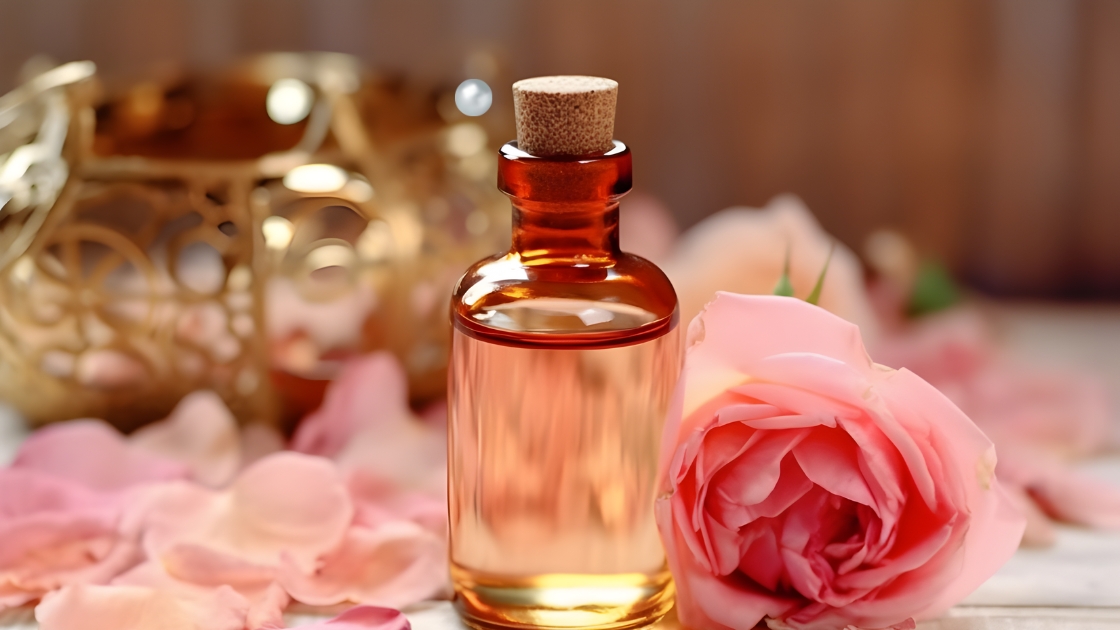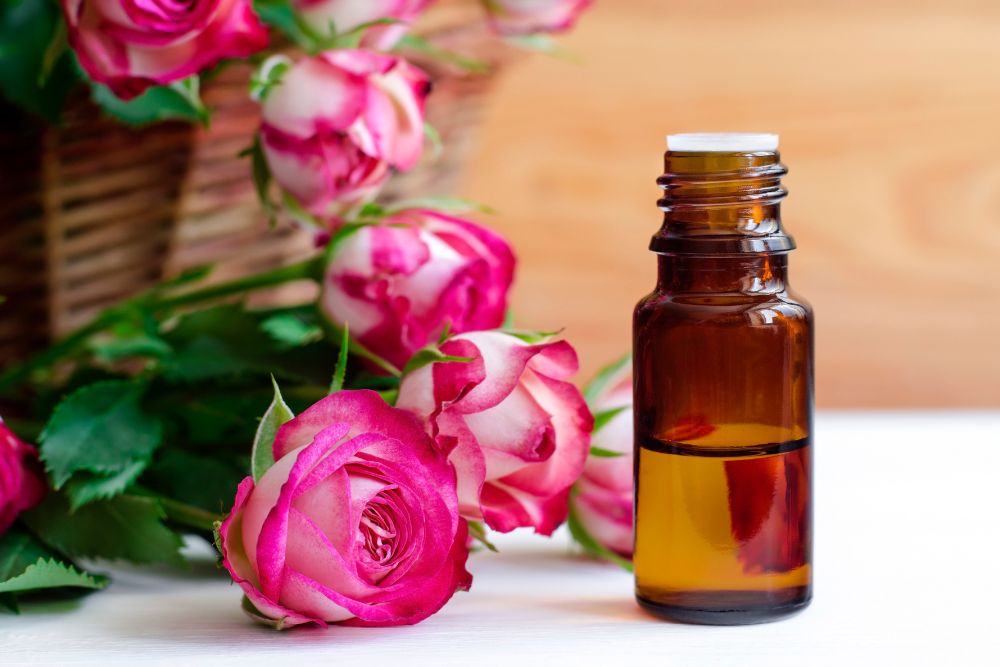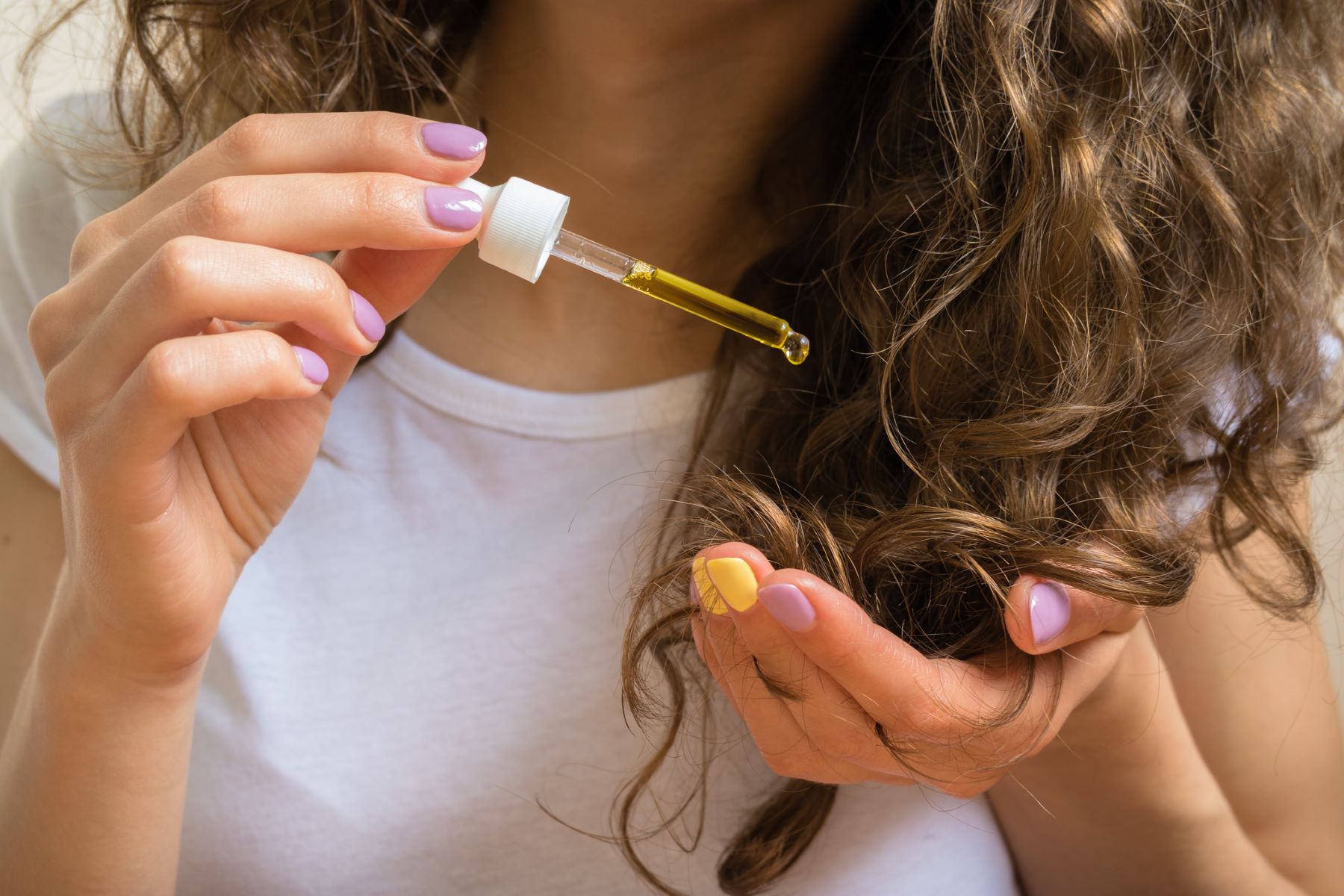How To Apply Rose Oil For Best Results - Tips And Tricks
Curious about the best way to apply rose oil? Whether it’s for glowing skin or luscious hair, this guide has you covered.
Sep 15, 20244.2K Shares264.7K Views

Imagine a natural remedy that enhances both your mood and your skin—rose oil offers this and more. This luxurious essential oil, distilled from thousands of fragrant rose petals, has been cherished for centuries for its ability to rejuvenate skin, calm the mind, and uplift the spirit.
Known for its rich scent and powerful properties, rose oil is a true beauty and wellness staple, blending both indulgence and effectiveness.
In this article, we will explore how rose oil can seamlessly fit into your skincare routine and self-care rituals.
From hydrating dry skin and treating inflammation to improving hair health and reducing stress, rose oil provides numerous benefits for those seeking natural, holistic solutions.
What Is Rose Oil?
Rose oil, often called "the queen of essential oils," is extracted primarily from the petals of Rosa damascenaand Rosa centifolia. Thousands of rose petals are carefully distilled to produce this precious oil, making it one of the most luxurious essential oils on the market.
The process of extracting rose oil is labor-intensive, as it takes around 10,000 petals to produce a single ounce of oil.
Historically, rose oil has been used in various cultures for its medicinal and beauty-enhancing properties. From ancient Persia to Cleopatra’s beauty rituals, this oil has been celebrated for centuries for its ability to soothe, nourish, and rejuvenate the skin and body.
Historical Uses Of Rose Oil In Skincare
The beauty secrets of rose oil stretch back thousands of years. Ancient royalty, including Cleopatra, famously incorporated rose oil into their skincare routines for its anti-aging and skin-preserving qualities. By the 16th century, rose oil became a luxury commodity in Europe, used in both perfumery and apothecaries. Today, rose oil continues to be a prized ingredient in modern beauty products, beloved for its timeless ability to promote healthy, glowing skin.
Essential Benefits Of Rose Oil
Rose oil offers a variety of benefitsfor both skin and emotional well-being, making it a versatile addition to your beauty and wellness routine. Let’s take a closer look at the top benefits:
1. Eases Pain
Studies have shown that rose oil can help reduce pain, particularly after surgery. In a 2015 study, children who inhaled rose oil reported a significant decrease in pain compared to those who used almond oil.
This is thought to be due to rose oil's ability to trigger the release of endorphins, often referred to as the "feel-good" hormone.
2. Relief From Menstrual Discomfort
Rose oil is also effective in reducing menstrual cramps. In a 2013 study, participants who received abdominal massages with rose oil experienced less cramping than those who were massaged with a carrier oil alone.
Incorporating rose oil into a massage routine can help alleviate discomfort during menstruation.
3. Reduces Anxiety And Stress
Rose oil is renowned for its ability to promote relaxation. Research indicates that applying rose oil to the skin lowers anxiety levels, heart rate, and blood pressure, making it an excellent choice for stress relief.
Inhaling rose oil through aromatherapy has also been shown to ease anxiety, particularly during high-stress situations like childbirth.
4. Antibacterial And Antifungal Properties
Rose oil contains powerful antibacterial and antifungal properties, making it a natural remedy for treating infections.
It is particularly effective against E. coliand Staphylococcus, as well as Candida albicans, which can cause fungal infections. Rose oil can be applied topically to wounds and infections, promoting faster healing.
5. Stimulates Libido
Rose oil has been shown to increase sexual desire, especially in individuals with depression. Studies suggest that rose oil helps stimulate dopamine production in the brain, which enhances mood and libido. This makes it a powerful tool for enhancing intimacy and improving sexual satisfaction.
6. Eases Depressive Symptoms
Several studies have highlighted rose oil’s ability to ease depression. In a 2012 study, postpartum women who used rose oil aromatherapy in conjunction with conventional treatments saw greater improvements in their symptoms than those who used standard treatments alone. Rose oil's ability to stimulate dopamine release may explain its antidepressant effects.
7. Anti-inflammatory Effects
Rose oil’s anti-inflammatory properties make it an ideal choice for soothing irritated skin. It can reduce redness, swelling, and irritation, making it beneficial for treating acne, rosacea, eczema, and other inflammatory skin conditions.
8. Hydrates And Moisturizes
Rose oil is a powerful hydrating agent, rich in essential fatty acids that help lock moisture into the skin. It’s particularly beneficial for dry or sensitive skin types, as it nourishes deep into the skin’s layers, leaving it soft and smooth.
9. Anti-Aging Properties
Rose oil is packed with antioxidants that combat free radicals, which accelerate the aging process. Regular use can help reduce the appearance of fine lines and wrinkles, improve skin elasticity, and promote a more youthful complexion.
10. Brightens And Evens Skin Tone
Rose oil can help lighten dark spots and even out skin tone by promoting cell regeneration and balancing oil production. Regular use of rose oil can leave your skin brighter and more radiant, making it a popular choice for those seeking a natural solution for hyperpigmentation.
How To Apply Rose Oil: Face And Skin
Rose oil is a versatile essential oil that can be incorporated into your skincare routine in several ways. Here’s how to apply it effectively for face and body care:
1. Patch Test Before Use
As rose oil is highly concentrated, it’s essential to perform a patch test before applying it to larger areas of your skin. Mix one drop of rose oil with a carrier oil (such as jojobaor almond oil) and apply a small amount to your forearm. If no irritation occurs after 24 hours, it’s safe to use on your face or body.
2. Dilute For Skin Application
Rose oil should always be diluted with a carrier oil to prevent irritation. Use the following dilution guidelines based on your skin type:
- Oily Skin: 1-2 drops of rose oil in a tablespoon of carrier oil.
- Combination Skin: 3-4 drops of rose oil in a tablespoon of carrier oil.
- Dry Skin: 5-6 drops of rose oil in a tablespoon of carrier oil.
3. Face Application
For facial care, mix 1-2 drops of rose oil with your regular moisturizer or serum. Gently massage the mixture onto your face in upward, circular motions, focusing on areas prone to dryness, redness, or acne. Rose oil can also be used at night to allow your skin to repair and rejuvenate while you sleep.
4. Body Care With Rose Oil
For body care, add a few drops of rose oil to your body lotion, body oil, or shower gel to enhance its nourishing properties. Rose oil can also be used in a relaxing bath—simply add 10 drops to a warm bath to help reduce stress and soothe sore muscles.
How To Apply Rose Oil For Hair Care
Rose oil’s nourishing properties extend to hair care as well. It can strengthen hair, reduce scalp irritation, and add shine. Here’s how to incorporate rose oil into your hair care routine:
1. Scalp Treatment
Rose oil can help soothe an irritated scalp and reduce hair loss. Mix a few drops of rose oil with a carrier oil like argan or coconut oil, and massage it into your scalp. Leave it on for 30 minutes before washing it out with a gentle shampoo. Repeat this treatment a few times a week for best results.
2. Hair Ends Treatment
To repair split ends, mix 2-3 drops of rose oil with a carrier oil and apply it to the ends of your hair. Leave it on for at least 30 minutes before rinsing, or leave it overnight for a more intensive treatment.
You Might Like: What Every Color Of Rose Symbolizes - A Quick Breakdown
Aromatherapy And Emotional Benefits Of Rose Oil
Rose oil is widely used in aromatherapy to promote relaxation and emotional well-being. Its floral scent has been shown to reduce stress, anxiety, and symptoms of depression. Here’s how to use it for emotional balance:
1. Diffuser Use
Add 5-8 drops of rose oil to a diffuser to fill your space with its calming aroma. Inhaling rose oil can lower cortisol levels and help you feel more relaxed and centered.
2. Topical Aromatherapy
For on-the-go relief from anxiety or stress, apply diluted rose oil to pulse points like your wrists, neck, and chest. You can also add a few drops to your favorite massage oil to enhance its relaxing effects.
Safety Tips And Contraindications
While rose oil is generally safe, there are a few precautions you should take to ensure its safe use:
- Dilution: Always dilute rose oil with a carrier oil before applying it to your skin to prevent irritation or burns.
- Patch Test: Always perform a patch test before full application to ensure you don’t have an allergic reaction.
- Pregnancy and Children: Pregnant women and children under 12 should avoid using rose oil without consulting a healthcare professional.
- Pets: Keep rose oil diffusers away from pets, especially if they have respiratory issues. Inhalation of essential oils can be harmful to animals.
What’s The Difference Between Rose Oil And Rosehip Seed Oil?
Rose oil and rosehip seed oil are both derived from roses but serve different purposes in skincare.
- Rose Oil: Extracted from rose petals, rose oil is primarily used in aromatherapy and skincare for its anti-inflammatory and antibacterial properties.
- Rosehip Seed Oil: Pressed from the seeds of the rose plant, rosehip seed oil is rich in essential fatty acids and is used for its moisturizing and anti-aging properties. It’s ideal for reducing the appearance of scars and promoting skin regeneration.
Frequently Asked Questions (FAQs)
Can You Ingest Rose Oil?
No, rose oil should not be ingested as it can cause nausea, indigestion, and other adverse effects.
Can I Use Rose Oil For My Face?
Yes, rose oil is excellent for facial care due to its hydrating, anti-aging, and anti-inflammatory properties. Always dilute it with a carrier oil before applying it to your face.
Does Rose Oil Lighten Skin?
Yes, rose oil can help lighten dark spots and even out skin tone over time, thanks to its cell regeneration properties.
Does Rose Oil Have Side Effects?
Rose oil is generally safe for topical use and aromatherapy, but always perform a patch test to check for allergic reactions before applying it to large areas of your skin.
Conclusion
Rose oil offers more than just its intoxicating fragrance; it’s a powerhouse for beauty and well-being. Regular use can transform your skincare routine, boost your emotional health, and provide much-needed relaxation.
Its versatility makes it an essential part of any self-care regimen, providing both immediate and long-lasting benefits.
With the knowledge of how to apply rose oilsafely and effectively, you're ready to experience its full potential. Incorporating rose oil into your daily routine can bring soothing relief to your skin and a sense of calm to your day.
Embrace the time-tested benefits of rose oil and enjoy its remarkable effects on both your beauty and wellness journey.
Jump to
What Is Rose Oil?
Historical Uses Of Rose Oil In Skincare
Essential Benefits Of Rose Oil
How To Apply Rose Oil: Face And Skin
How To Apply Rose Oil For Hair Care
Aromatherapy And Emotional Benefits Of Rose Oil
Safety Tips And Contraindications
What’s The Difference Between Rose Oil And Rosehip Seed Oil?
Frequently Asked Questions (FAQs)
Conclusion
Latest Articles
Popular Articles

